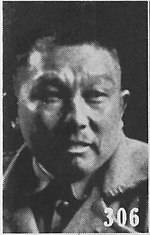Yang Sen
Yang Sen | |
|---|---|
 General Yang Sen as pictured in The Most Recent Biographies of Chinese Dignitaries | |
| Native name | 楊森 |
| Born | 20 February 1884 Guang'an, Sichuan, Qing dynasty |
| Died | 15 May 1977 (aged 93) Taipei, Taiwan |
| Allegiance | |
| Years of service | 1904–1977 |
| Rank | General |
| Unit | Beiyang Army |
| Commands held | Governor of Sichuan Province, Military-Governor of Sichuan Province, General Officer Commanding XX Corps, Commander in Chief 27th Army Grou, Deputy Commander in Chief 6th War Area, Deputy Commander in Chief 9th War Area, Chairman of the Government of Guizhou Province |
| Battles/wars | |
| Awards | Order of Blue Sky and White Sun |
| Relations | Yang Hanxiu (楊漢秀, niece, 1913-1949) Yang Hanlie (楊漢烈, son, 1917-1987) |
| Other work | Politician |
Yang Sen (Chinese: 楊森; pinyin: Yáng Sēn; 20 February 1884 – 15 May 1977) was a warlord and general of the Sichuan clique who had a long military career in China. Although he was a provincial warlord, he loyally served Chiang Kai-shek and his Kuomintang (KMT) government, especially during the Second Sino-Japanese War. He also served as governor of Sichuan and Guizhou provinces. After the Communists defeated the KMT in the Chinese Civil War, he retreated with the KMT government to Taiwan.
He was also known as a Taoist master and had numerous wives, concubines and children. He published a book about the supercentenarian Li Ching-yuen, who supposedly lived 197 or 256 years.
Biography[edit]
- 1924–24 Governor of Sichuan Province
- 1924–25—Military-Governor of Sichuan Province
- 1926 -Wanhsien Incident, combat with British patrol vessels on the river Yangtse
- 1933–38—General Officer Commanding XX Corps
- 1938–44—Commander in Chief 27th Army Group
- 1939–40—Deputy Commander in Chief 6th War Area
- 1940–45—Deputy Commander in Chief 9th War Area
- 1945–48—Chairman of the Government of Guizhou Province
- 1949—moved to Taiwan during the Nationalist exodus from the mainland
- 1950s—An avid sports person, he was the Republic of China's Olympic Committee Chairman and at the Olympic Games in Mexico carried the national flag of Taiwan, Republic of China in the opening ceremony. He was a well-known mountaineer and the Chairman of the Taiwan Mountain Climbing Association as well. He had 12 wives and 43 children at least.[1]
Meeting Master Li Ching Yuen[edit]
General Yang knew the Taoist Master Li Ching-yuen personally and became his disciple, practicing his teaching until the end of his life.
In 1927 he invited him to his residence in Wanxian, Sichuan. After his master's death, General Yang wrote the report "A Factual Account of the 250 Year-Old Good-Luck Man.", where he described Li Ching Yuen's appearance: "He has good eyesight and a brisk stride; Li stands seven feet tall, has very long fingernails, and a ruddy complexion."
The Tai Chi Chuan Master T. T. Liang (Liang Tung Tsai) learned from General Yang the practice of the "Eight Brocade Qigong". His student Stuart Alve Olson wrote in 2002 the book "Qigong Teachings of a Taoist Immortal: The Eight Essential Exercises of Master Li Ching-Yun", taking General Yang's report as reference.
See also[edit]
References[edit]
- ^ "404-页面不存在".
{{cite web}}: Cite uses generic title (help)
This article includes a list of general references, but it lacks sufficient corresponding inline citations. (May 2016) |
- Daniel Reid, "Tao of Health, Sex, and Longevity.", Fireside, New York, 1989, pp. 345–349. ISBN 0-671-64811-X
- Hsu Long-hsuen and Chang Ming-kai, "History of The Sino-Japanese War (1937–1945)." 2nd Ed., 1971. Translated by Wen Ha-hsiung, Chung Wu Publishing; 33, 140th Lane, Tung-hwa Street, Taipei, Taiwan Republic of China.
- OLSON, Stuart Alve. "Qigong Teachings of a Taoist Immortal: The Eight Essential Exercises of Master Li Ching-yun." Healing Arts Press, 2002. ISBN 0-89281-945-6
- Yang Sen. "A Factual Account of the 250 Year-Old Good-Luck Man." (一个250岁长寿老人的真实记载). Published by the Chinese and Foreign Literature Storehouse, Taipei, Taiwan.
